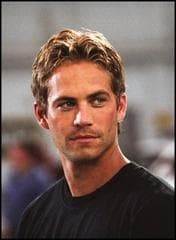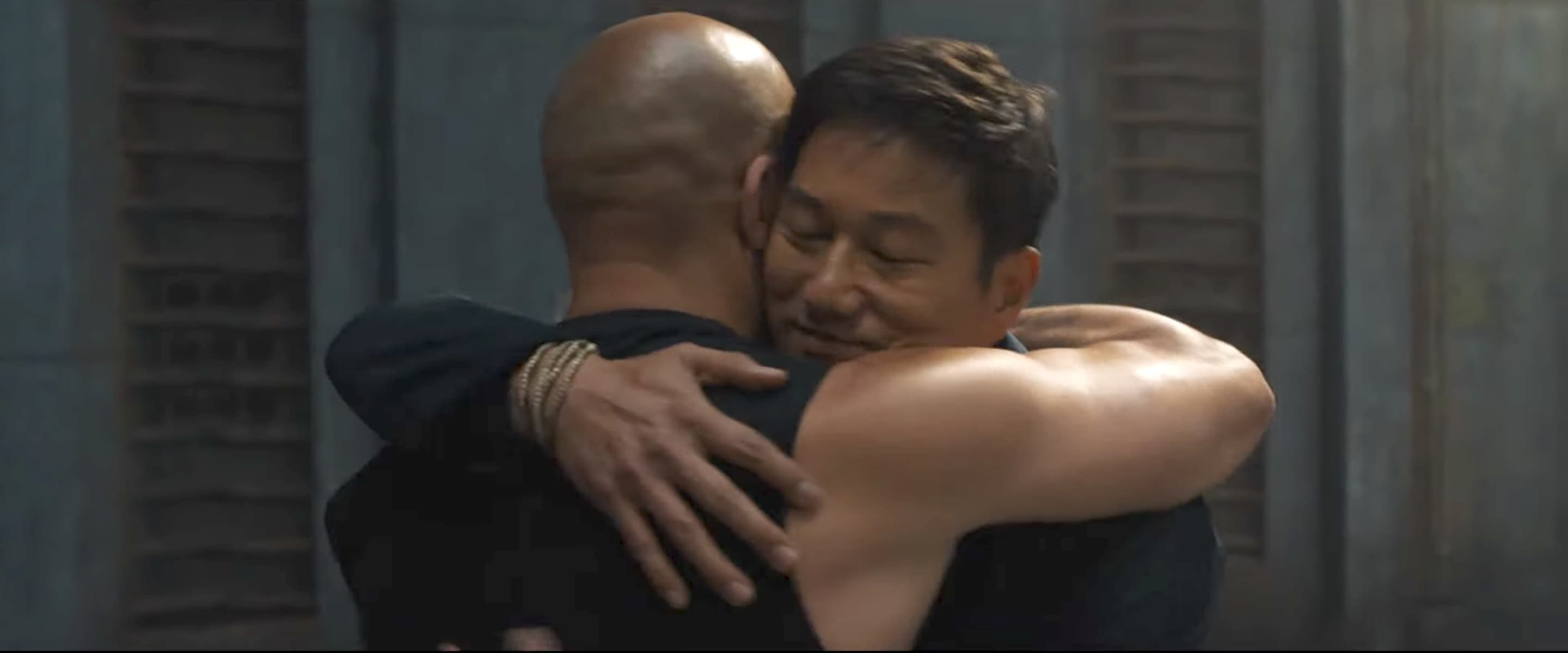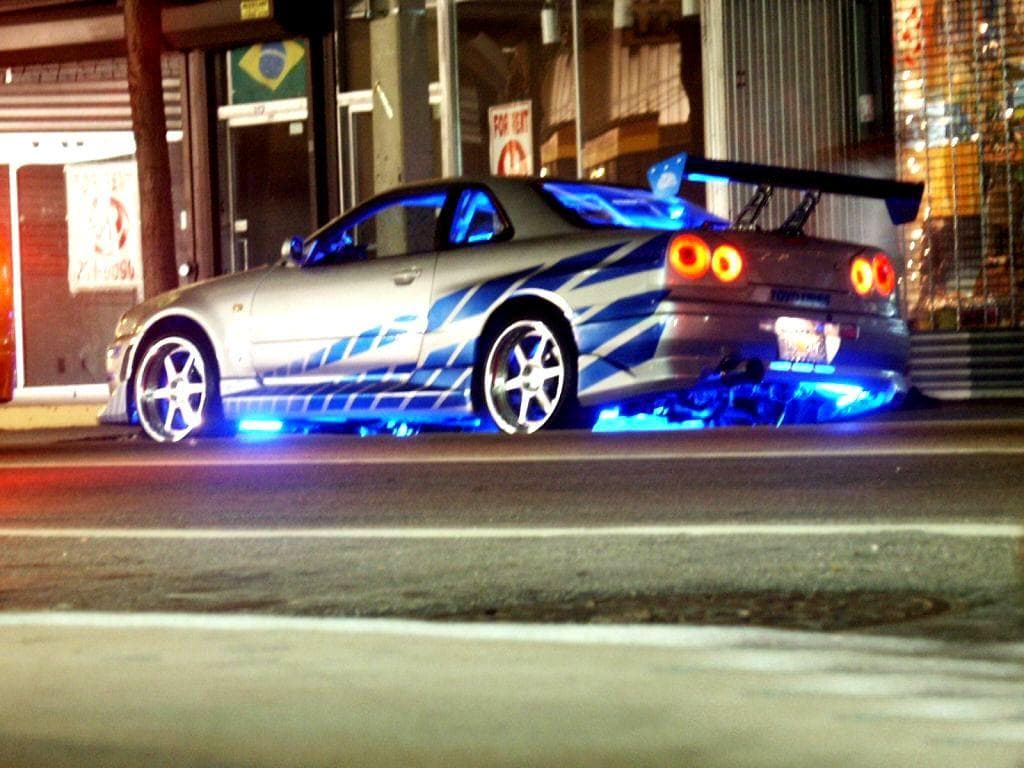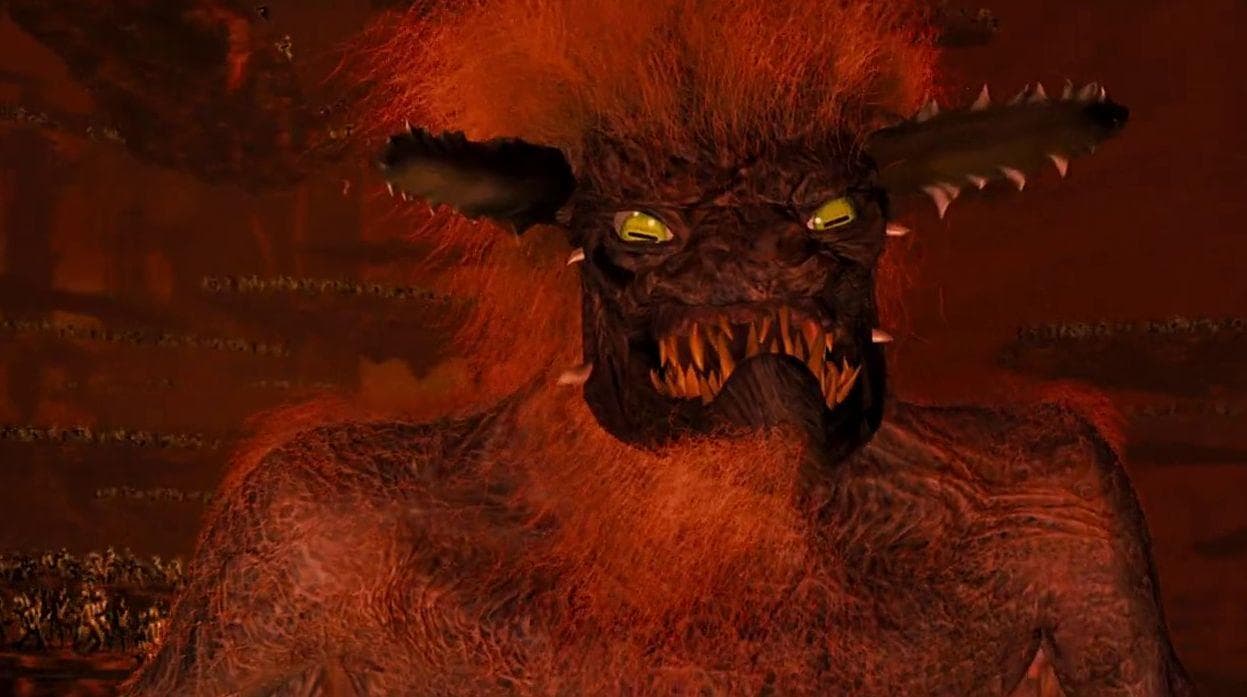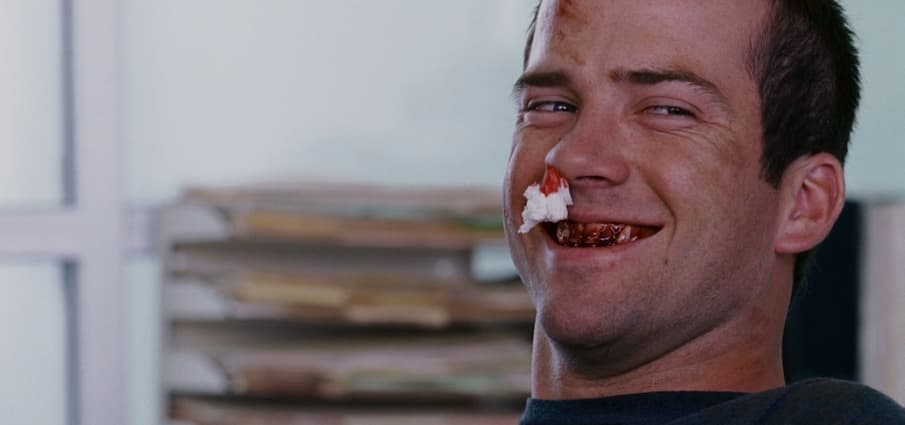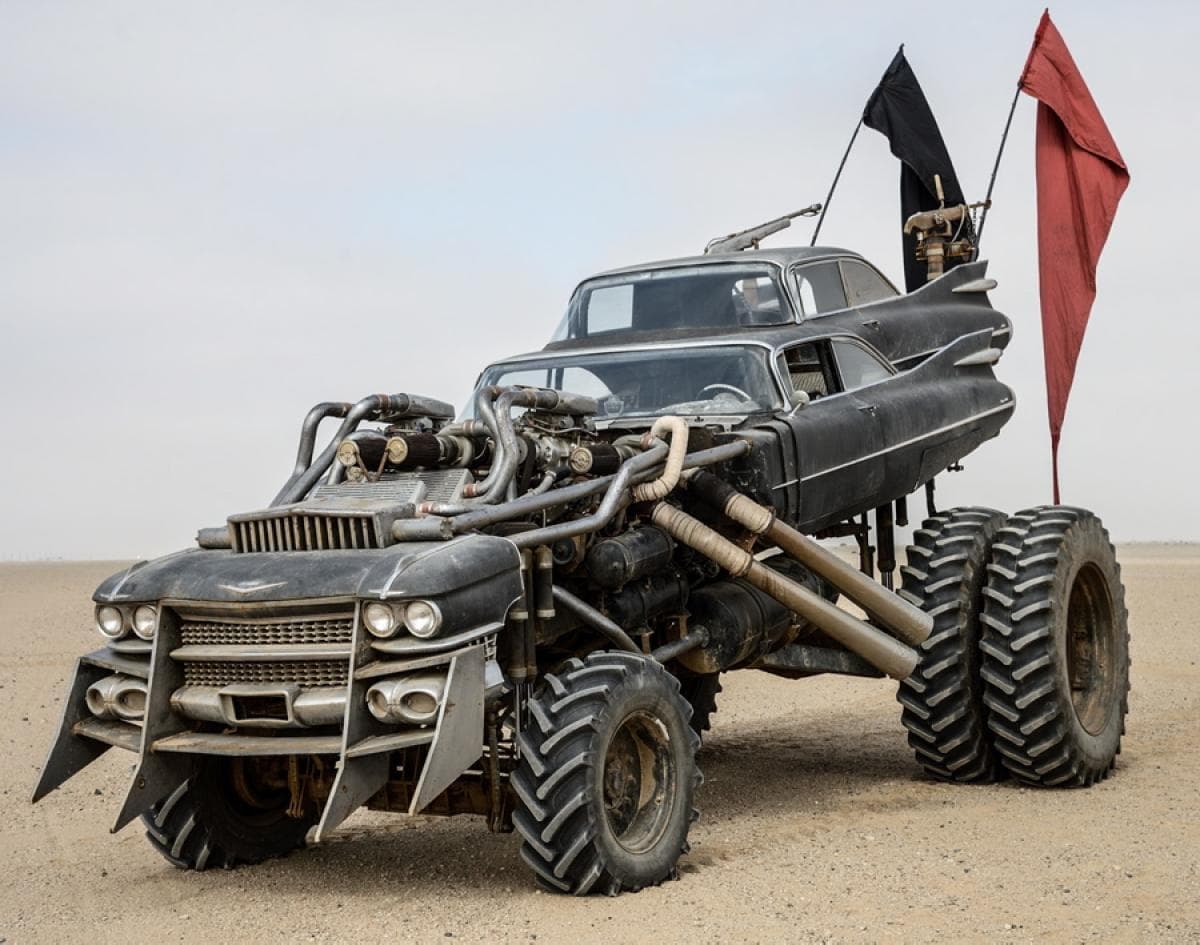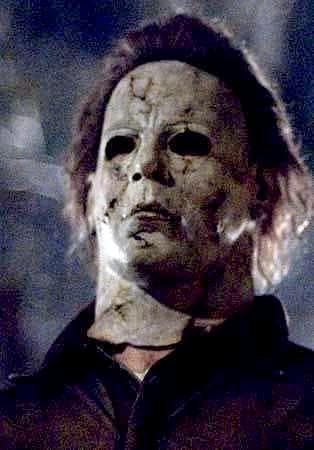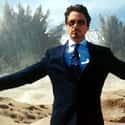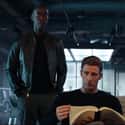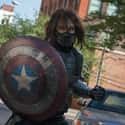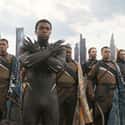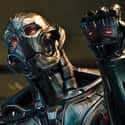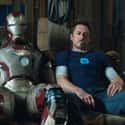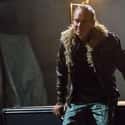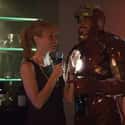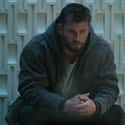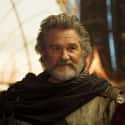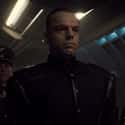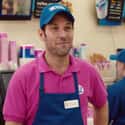-
(#1) Iron Man
- Robert Downey Jr., Terrence Howard, Jeff Bridges, Shaun Toub, Gwyneth Paltrow, Faran Tahir, Paul Bettany, Leslie Bibb, Jon Favreau, Clark Gregg, Samuel L. Jackson
Tony Stark's entire arc revolves around him becoming an increasingly better person after decades of being a self-absorbed playboy and arms manufacturer, profiting off his involvement with the military-industrial complex. His starting point, before his abduction, shows Tony trying to sell the Jericho missile to the US military for use in Afghanistan. In his pitch, he tells the top brass, "Find an excuse to let one of these off the chain, and I personally guarantee you the bad guys won't even want to come out of their caves."
After discovering the real-world consequences of his war profiteering - namely, that weapons his company made were being sold to terrorists and being used in mass genocides - Tony's perspective changes and his aim becomes a drive to help, partially fueled by the horrors for which he himself was responsible. This is not a lesson his rival, Justin Hammer, has learned in Iron Man 2. Hammer is like a poor man's Tony Stark, and tries to use his own robotic creations for military contracts. The plan ends up failing spectacularly.
But there is one through-line across both films: There will always be someone looking to make money off war and suffering. And in the real world, you'll rarely find a man in Tony Stark's position who's willing to put his foot down and demand change.
-
(#2) Captain America: Civil War
- Chris Evans, Robert Downey Jr., Scarlett Johansson, Sebastian Stan, Anthony Mackie, Don Cheadle, Jeremy Renner, Chadwick Boseman, Paul Bettany, Elizabeth Olsen, Paul Rudd, Emily VanCamp, Tom Holland, Frank Grillo, William Hurt, Daniel Brühl
In the first act of Civil War, the Avengers find themselves in Lagos, Nigeria, in an effort to stop terrorists from swiping a biological weapon from a lab. In the ensuing conflict, Scarlet Witch telekinetically redirects an explosion that would have wiped out her comrades, but inadvertently takes out a number of Wakandan humanitarian workers. It leads to public outrage over the Avengers operating without permission on a global scale - not to mention severe guilt for Scarlet Witch.
The conflict, however, mirrors the real-world debate over interventionism and America serving as a world police force, operating with semi-legal jurisdiction in countries across the world under the pretense of protecting global peace. The debate over American interventionism has raged for decades, with arguments for and against isolationism and increased oversight, all of which play out to different degrees in Civil War, and it adds a uniquely distinct realism to the drama. It's not about good guys versus bad guys, but rather nuanced political philosophy.
The events in Lagos lead to a call for the Avengers to be overseen by a panel of United Nations politicians who will control the authorization of future operations. Tony Stark and Steve Rogers find themselves divided, with Stark arguing that oversight is important for transparency, while Rogers argues that politicians with potential ulterior motives shouldn't dictate when or how the Avengers save the world.
This, too, reflects the long-fought argument over government oversight of organizations, such as the Center for Disease Control or the World Health Organization, and the question of whether or not those organizations' efforts are impacted by the politicians who may or may not dictate their objectives.
-
(#3) Captain America: The Winter Soldier
- Scarlett Johansson, Cobie Smulders, Samuel L. Jackson, Robert Redford, Elizabeth Olsen, Chris Evans, Emily VanCamp, Hayley Atwell, Stan Lee, Gary Sinise, Georges St-Pierre, Aaron Taylor-Johnson, Jenny Agutter, Tom Morello, Sebastian Stan, Toby Jones, Garry Shandling, Anthony Mackie, Frank Grillo, Thomas Kretschmann, Danny Pudi, Alan Dale, Callan Mulvey, Steven Culp, Nestor Serrano, Maximiliano Hernández, Eddie J. Fernandez, Branka Katić, Ed Brubaker, Dominic Rains, Bernard White, David Cohen, Henry Goodman, Evan Parke, Pat Healy, Aaron Himelstein, Patrick Michael Strange, Robert Clotworthy, Wendy Hoopes, Chin Han, Zack Duhame, DC Pierson, Andy Michaels Jr., Chad Todhunter, Ethan Rains, June Christopher, Shannon Edwards, Vincent Riviezzo, Paul J. Porter, Joel Thingvall, Jeremy Maxwell, Salvator Xuereb, Stephen McFeely, Emerson Brooks, Al Sotto, Adetokumboh M'Cormack, Logan Fry, Brent Reichert, Brian Duffy, Bernard Zilinskas, Dan Anders, Shawn Gonzalez, Travis Bush, David Gragg, Annette Lawless, Rydell Danzie, Joel Shock, Jon Sklaroff, Andrew Knode, Matthew Skomo, Brent McGee, Scott Lockhart, Gozie Agbo, Troy Bogdan, Kriz Chris Henri Harriz, Xavier Wolf, Robert P. Thitoff, Aswan Harris, Sharyn Kmieciak, Jody Hart, Demetrice Nguyen, Deezy, Raiden Integra, Tom Shafer, Michael Simpson Jr., James Lewis, Johanna McGinley, Paul Nandzik, Roshawn Franklin, Christopher Markus, Joseph McCaughtry, Les Mahoney, Edward Pfeifer, Neal McNeil, Sharita Bone, Cullen Chambers, Rachel Camacho, Jordan Michael Coulson, Ricardo Chacon, Alan Davis, Orlando McNary, Diedra Arthur-O'Ree, Rod Fielder, James Howard, Nicolas Bosc, Earl Rorer, Abigail Marlowe, Sue Danna Myer, Christopher Kaczmarek, Jennifer Lavi, Jason Speer, LaTrallo Presley, Michael V. Chastain, Angela Russo-Ostot, Dot Gregory, Andrew Constantini, George Ludden, Katana Martinez, Rachel Herrick, Derek Hughes, Nicholas Gibeault, Jason Klingensmith, Gabriella Sagnes, Brian R. Moore, Kayla McDonald, Charles Wittman, Jeff Seich, Adrian Denzel, Kris Leiter, Jason L. Wang, Christopher Warner, Nate Hatton, Brittany Buck, Jose W. Byers, Marse Ratliff, Rick Dremann, Ben Atkins, Guy Cusson, Shaira Barton, JoAnna Leigh Gerondale, Kimberly Pal, Lucas Lind, Charlene May, Rasik Ohal, Theresa Wylie, Dante Rosalina, Terence O'Rourke, Ulysses E. Campbell, Bryan Geary, Cullum Andrews, Bill Kennedy, John Fecek, Ann Russo, Thomas R. Baker, Brett R. Miller, Colin Botts, Tara Kodosky, Carmen Gangale, Chris Jameson, Christina Shaffer, Allan Chanes, Cristee Brianas, Eric Lee Huffman, Andrew Kiser, Christopher George Sarris, Phil Mallon, Griffin M. Allen, Joe Rosalina, Lauren Gabbard, Trent Rowland, Davis Aguila, Britney Meeks, Michael Debeljak, Dean Barlage, Ray Hodge, Danea Rhodes, Paul Roberts, Jenna Hoskins , Michael De Gues, Anne Grimenstein, Inder kumar, Sage Porter, David Hill, Jason G. Sarris, Nicole Tubbs, Terry McConnaughey, Dyrell Barnett, Robert B. Schneider IV, Sandhya Chandel, John Brooks Jr., Carmen Dee Harris, Jeremy Michael Burns
The Winter Soldier may be the most subversive and politically charged film in the whole of the MCU. One of the primary elements of the story involves S.H.I.E.L.D. building a trio of heavy-duty helicarriers linked up to spy satellites that can eliminate threats to America with surgical precision from the sky. Everyone can be located and targeted for termination remotely at any time. This obviously does not sit well with Steve Rogers or Nick Fury.
S.H.I.E.L.D.'s Secretary of Internal Security Alexander Pierce is led to believe that Cap has secretly been in league with a mysterious rogue assassin known as the Winter Soldier, and he is forced to go on the run while avoiding security cameras and surveillance tech. Throughout the movie, the real threat is the inevitable overreach of technological infrastructure and the creation of a surveillance state - which many argue has already become a reality in countless countries across the globe.
Additionally, The Winter Soldier serves as a fierce condemnation of the corruption and creeping influence of fascism in the halls of government in the real world. This is evident in the shocking reveal that Hydra (the MCU's quasi-Third Reich analog) has installed operatives into the highest levels of Washington, DC - including Senator Stern and Alexander Pierce himself, who is revealed to be behind the Winter Soldier's actions.
-
(#4) Black Panther
- Chadwick Boseman, Michael B. Jordan, Lupita Nyong'o, Danai Gurira, Martin Freeman, Daniel Kaluuya, Letitia Wright, Winston Duke, Angela Bassett, Forest Whitaker, Andy Serkis
Wakanda is a small but wildly technologically advanced African nation that has long managed to hide the truth of its scientific advances through a staunch governmental policy of isolationism (and also a hyper-advanced cloaking shield that literally hides the country under a hologram dome).
Wakanda's rationale for isolating itself from the world is understandable, as the possession of potent natural resources like vibranium has always been like a dinner bell for hungry colonialists throughout history. However, it also serves as a point of conflict between King T'Challa (AKA Black Panther) and his rival for the throne, Eric Killmonger, who wants to expand Wakanda's influence over the world.
Ultimately, T'Challa realizes that Wakanda has a moral imperative to reveal the nation's true capabilities and offer help to other countries in the form of international outreach initiatives that could provide lifesaving technologies to people and countries in need. It's the same debate that has raged in America for generations with regard to our intervention in world events and geopolitical affairs.
-
(#5) The Avengers: Age of Ultron
- Robert Downey Jr., Chris Hemsworth, Mark Ruffalo, Chris Evans, Scarlett Johansson, Jeremy Renner, Don Cheadle, Aaron Taylor-Johnson, Elizabeth Olsen, Paul Bettany, Cobie Smulders, Anthony Mackie, Hayley Atwell, Idris Elba, Stellan Skarsgård, James Spader, Samuel L. Jackson
Tony Stark is almost solely responsible for the events that spark Ultron's devastation in Sokovia, all because Tony thinks he is responsible for - and also the only one capable of - protecting the globe. The true impetus behind the conflict in Age of Ultron stems from Tony's god complex. No matter how well-meaning his intentions, it's a sign of his increasing struggle with a sort of benevolent megalomania. And, as a god complex would imply, there's a delicate and almost conflicting balance between Tony and his "child," Ultron, whom Tony invents to protect mankind.
However, the real-world concerns regarding the application of artificial intelligence also fuel the dramatic tension, as Ultron represents the extreme of mankind's fears over AI robotics. Knowing he is smarter and better than anything else, Ultron sees no reason not to subjugate those weaker than himself. As many futurists and tech-alarmists have postulated, the rapid-learning algorithms and self-evolving programming of AI could easily lead to a shift in the dominant role humans play on the planet. In Age of Ultron, these fears are made manifest in the eponymous villain.
-
(#6) Iron Man 3
- Gwyneth Paltrow, Robert Downey Jr., Ben Kingsley, Don Cheadle, Guy Pearce, Stan Lee, Paul Bettany, Jon Favreau filmography, Rebecca Hall, Fan Bingbing, James Badge Dale, William Sadler, Miguel Ferrer, Stephanie Szostak, Ty Simpkins, Ashley Hamilton, Dale Dickey, Yvonne Zima, Justin Wheelon
Tony Stark goes from an amoral playboy billionaire in Iron Man to a drunken, frightened self-described savior in Iron Man 2. Stark's appearance in Iron Man 3 continues his incredible arc as it reflects the emotional and psychological toll of the Battle of New York, as seen in The Avengers. The sight of the devastation, the truth of the real scope of the universe, and Stark's own near-death experience (when he literally flew through a cosmic wormhole and saved the globe from an alien invasion with a nuke), have all coalesced into some severe emotional damage and PTSD.
Stark is struggling with panic attacks and self-doubt, he can't sleep, and he heartbreakingly summarizes his struggle when he tells his girlfriend/business partner Pepper Potts, "Nothing's been the same since New York. You experience things, and then they're over and you still can't explain them? Gods, aliens, other dimensions, and I'm just a man in a can." The issue begins to get worse and worse, and Stark is crippled with his anxiety and fear when faced with thinking back on his own experiences. But he manages to move forward and work past his barriers.
The film's representation of PTSD and trauma has been lauded and Robert Downey Jr.'s performance has been celebrated for realistically depicting the debilitating impact PTSD can have on anyone - even someone as self-assured and cocky as Tony Stark. While the real roots of PTSD can be wildly varied and manifest in myriad ways, Iron Man 3 is an honest look at the problem and a remarkable demonstration that trauma can affect anyone - and it doesn't make them weak, it just makes them human.
-
(#7) Spider-Man: Homecoming
- Tom Holland, Michael Keaton, Zendaya, Donald Glover, Jacob Batalon, Laura Harrier, Tony Revolori, Tyne Daly, Bokeem Woodbine, Marisa Tomei, Robert Downey Jr.
The American dream of prosperity, and disillusionment with the reality of that dream, play a central role in Spider-Man: Homecoming, specifically with regard to the motivations of the film's primary antagonist, Adrian Toomes, AKA Vulture. As seen early on in the film, Toomes is an honest, hard-working, blue-collar owner of a salvage company who nabs a big contract cleaning up the damage left in the wake of the Battle of New York. However, Stark Industries, in collaboration with the government, commandeers the clean-up and Toomes's company goes belly up.
While Tony Stark is a hero, he's still a billionaire with connections in the government who - intentionally or not - steps on the neck of a small business owner and upends his legitimate livelihood. Feeling alienated and betrayed by the government, Stark, and fate itself, Toomes and his men make the best of the situation by collecting the alien tech they've already salvaged and using it to create next-generation weapons, which they begin to sell illegally to the highest bidder.
Throughout Spider-Man: Homecoming, Toomes's motivations are not inherently malevolent or nefarious. He's not interested in using the alien tech to oppress anyone or destroy the world. Instead, he's a man who wants to provide a nice life for his wife and daughter by any means possible. When he discovers that playing by the rules doesn't work because the game itself is rigged, he finds another, albeit illicit, way to achieve the American dream previously denied to him.
-
(#8) Iron Man 2
- Robert Downey Jr., Gwyneth Paltrow, Don Cheadle, Scarlett Johansson, Sam Rockwell, Mickey Rourke, Samuel L. Jackson, Clark Gregg, Jon Favreau, John Slattery, Garry Shandling, Paul Bettany
Giving Tony Stark some sort of vulnerability seems to be the driving motivation for the writers of every film he appears in - whether it's a physical vulnerability (like his need for an arc reactor to keep his heart going in Iron Man), or a psychological vulnerability, like his emotional difficulties in Iron Man 3. However, for Iron Man 2, the filmmakers decided to delve deep into the character's increasing alcohol dependency.
Loosely inspired by the 1979 Invincible Iron Man comic storyline "Demon in a Bottle," Tony becomes an increasingly reckless alcoholic when he discovers that the palladium used in his lifesaving arc reactor in his chest is also poisoning him. If he takes it out, he's toast; if he leaves it in, he's toast. Unwilling to tell anyone about his problems, Tony instead accepts what he thinks is his inevitable fate and indulges in booze and debauchery at the expense of his relationships.
After getting drunk while wearing the Iron Man suit at what he thinks will be his last-ever birthday party, Tony ends up getting into a fight with his best friend, James Rhodes, wearing a prototype armor suit. This leads to Tony having his suit confiscated and losing his friend. The film serves as an examination of the consequences of vice, told on a superhero scale. It's only when he turns to Nick Fury and works through past emotional issues with his late father that he is able to overcome his own demons.
-
(#9) Avengers: Endgame
- Robert Downey Jr, Josh Brolin, Mark Ruffalo, Tom Hiddleston, Chris Evans, Chris Hemsworth, Jeremy Renner, Chris Pratt, Elizabeth Olsen, Benedict Cumberbatch, Evangeline Lilly, Karen Gillan, Anthony Mackie, Tom Holland, Zoe Saldana, Dave Bautista, Paul Bettany, Scarlett Johansson, Jon Favreau, Gwyneth Paltrow, Sebastian Stan, Don Cheadle, Pom Klementieff, Paul Rudd, Brie Larson
Amid the epic battle scenes and long-awaited superhero team-ups, the final two Avengers films are filled with small, poignant moments of humanity and pain that paint a stark portrait of suffering in the face of loss and tragedy. As Thanos strives to halve the population of the universe - under the self-deluded guise of being a savior - he leaves swaths of casualties and broken families in his wake.
Long before he snaps his fingers and instantly dissolves half of the beings in the universe, he was already going from planet to planet ruthlessly slaying millions with his armies. The painful tendrils of this villainy can be seen in Gamora - who was "adopted" by Thanos after he offed her family - as well as Drax, who is driven by an undying need for revenge over the execution of his family.
The ramifications of real-world genocides are mirrored in the film's portrayal of how trauma can change the course of people's lives. The pain of real genocides still lives on in the children and grandchildren of those impacted by them, in the same way that Thanos's genocidal actions inexorably changed those whose lives were uprooted by them.
Even in a more direct sense, the pain and psychological trauma of genocide can be seen in Endgame when, five years after the Snap, Steve Rogers attends group therapy sessions where people lean on one another to find comfort and support while struggling to deal with their unimaginable losses.
-
(#10) Guardians of the Galaxy Vol. 2
- Chris Pratt, Zoe Saldana, Dave Bautista, Vin Diesel, Bradley Cooper, Michael Rooker, Karen Gillan, Sean Gunn, Glenn Close, Pom Klementieff, Elizabeth Debicki, Chris Sullivan, Kurt Russell
There's a famous, deeply influential quote from the great American playwright August Wilson that states, "When the sins of our fathers visit us we do not have to play host. We can banish them with forgiveness." The concept of living under the shadow of one's father is a universal one - even more so for those who grew up under the iron fist of a tyrannical disciplinarian. And for the characters in the MCU, this seems to be a particularly prevalent theme.
Some characters have more complex relationships with their parents based on their desires to impress or best them - such as Tony Stark's emotionally strained bond with his father Howard Stark, or Thor's attempts to live up to his father Odin's expectations. However, the MCU has also explored the echoing ramifications of emotionally and physically abusive fathers, and the psychology of abuse itself.
Look at Ego the Living Planet in Guardians of the Galaxy Vol. 2 and Thanos in Avengers: Infinity War. Ego is the absentee father of Peter Quill; after reconnecting with Peter, he wants his son to follow in his footsteps. When Peter resists - specifically after discovering that Ego was responsible for his mother's cancer, and thus her demise - Ego flies into a self-entitled rage and tries to slay his own son.
As for Thanos, he is the "adoptive" father of Gamora (which is really the closest term to use for essentially snatching her after wiping out her family). He, like Ego, trains Gamora to follow in his footsteps, but ultimately sacrifices her for his own ends, because he can't love anything more than his own blind ambition.
However, it's interesting to see how Marvel portrays both Ego and Thanos not as remorseless villains, but rather as powerful figures who have been consumed by their own passions, and have managed to convince themselves that their behavior and actions are appropriate. They don't hurt their children for joy, but because their warped minds have convinced them it's the only option. It's a disturbingly nuanced look at familial mistreatment and excuse-making.
-
(#11) Captain America: The First Avenger
- Samuel L. Jackson, Chris Evans, Tommy Lee Jones, Natalie Dormer, Hugo Weaving, Hayley Atwell, Stan Lee, Amanda Righetti, Jenna Coleman, Stanley Tucci, Richard Armitage, Laura Haddock, Sebastian Stan, Toby Jones, Dominic Cooper, Neal McDonough, Derek Luke, David Bradley, JJ Feild, Anatole Taubman, Colin Stinton, William Hope, Michael Brandon, Spencer Garrett, Lex Shrapnel, Kenneth Choi, Erich Redman, Simon Kunz, Amanda Walker, Doug Cockle, Ben Batt, Michael Swan, David McKail, Graham Curry, Ben Uttley, Katherine Press, Vincent Montuel, Peter Stark, James Payton, Nathan Nolan, Jan Pohl, Matt Kohler, Joshua Margulies, Jack Gordon, Geoff Searle, Martin Sherman, Nicholas Pinnock, Kirsty Mather, Teresa Mahoney, Paul Davies, Patrick Monckeberg, Sam Hoare, Oscar Pearce, Leander Deeny, Marcello Walton, Sophie Colquhoun, Damon Driver, Ronan Raftery, Martin Poole, Fernanda Toker, Matt Tyzack, Brian Niblett, Rosanna Hoult, Jacob Johnston, Sergio Corvino, Michael Aston, Luke Allen-Gale, Nick Hendrix, Marek Oravec, Michelle Antrobus, Bruno Ricci, Scott Ford, Addison LeMay, Mark Callum, Mark Badham, Kevin Millington, Darren Simpson, Mollie Fitzgerald, Nicole Evans, Adam Birch, Michael Humphrey, Drew Sherman, Nicole May, Jennifer Abbotts, Megan Sanderson, Emma Harris, Paul Bergquist, Gregory Paulett, Rosie Pethullis, Stevie-Jean McGuire, Danielle Kelly, Paul Simmons, Marc Wheeler, Lucie Waugh, Lucy Dean, Wiliam Morris, Erin Dusek, David Sdall, Stephanie Jayne Thompson, Rachel Quartley, Caroline Royce, Jessica Powell, Chris Diggle, Sarah Riches, Lizzi Franklin, Anna McNicholas, Naomi Slights, Rachael Isherwood, Maxwell Newman, Billy Lozowski, Richard Freeman, Kieran O'Connor, James Chahine, Todd Von Joel, Joe Garvey, Adam Kent, Colin Reilly, Robert Clayton, Chris Jorie, Alan Mandel, Sy Turner
The threat of the Nazi-esque Hydra organization has cropped up again and again throughout the MCU, and like the Nazis themselves, Hydra has threatened the peace, stability, and very existence of humanity. However, in Captain America: The First Avenger, the actual, nightmarish reality of the Axis powers isn't just alluded to - it's the real historical backdrop for the entire film.
Before getting the super soldier serum that eventually turns him into Captain America, Steve Rogers is just a scrawny kid from Brooklyn with an unimpeachable moral compass who wants to do anything he can to join the army and fight the Third Reich. His story mirrors the famous exploits of Audie Murphy, who lied about his age to join the army, was almost turned down for being underweight and sickly, and then went on to be a war hero, honored with every single combat award given by the US military - as well as the Congressional Medal of Honor for his heroic bravery.
Having Captain America fight Nazis is also a call-back to the character's impact on the real propaganda materials of the time. While Captain America, in the films, served as a recruiting tool and walking advertisement for the war effort and a morale booster, the same was true of the Captain America character in comic books after he was introduced in 1941.
-
(#12) Ant-Man
- Paul Rudd, Michael Douglas, Evangeline Lilly, Corey Stoll, Bobby Cannavale, Michael Peña, Tip "T.I." Harris, Anthony Mackie, Wood Harris, Judy Greer, David Dastmalchian
When Scott Lang is released from prison after being convicted of white collar cybercrime, he tries to go straight and get a real job at Baskin-Robbins. Because of his record, he applies under a fake name, but gets the job and is a model employee. However, after it's discovered that he's an ex-con, he's immediately fired from his job. In an effort to pay child support, he has to resort to burglary because he can't find a legal way to make ends meet.
While in Ant-Man this concern simply serves as a catalyst for the story, and to get Scott into Hank Pym's home, it's a surprisingly astute observation on the hiring discrimination that many people face after serving time, and the subsequent recidivism that often occurs when those same people feel they have no legal recourse or options for living a life on the right side of the law.
New Random Displays Display All By Ranking
About This Tool
We all know the MCU movies are sci-fi movies about a variety of superheroes. For many Marvel fans, the Marvel Cinematic Universe is definitely a very interesting place. The Marvel Cinematic Universe has shown so many members who have superpowers or talented skills, whether those are bad supervillains or superheroes who are selfless. But actually, the filmmakers would like to combine some elements of the real-world issues when producing the movies.
This page shows 12 entries, there are random times MCU movies touched on serious real-world issues, such as Iron Man, Avengers: Endgame, Ant-Man, and more. Welcome to find more information about movies. What meaning is contained in the movie? It needs to be explored by yourself.
Our data comes from Ranker, If you want to participate in the ranking of items displayed on this page, please click here.

